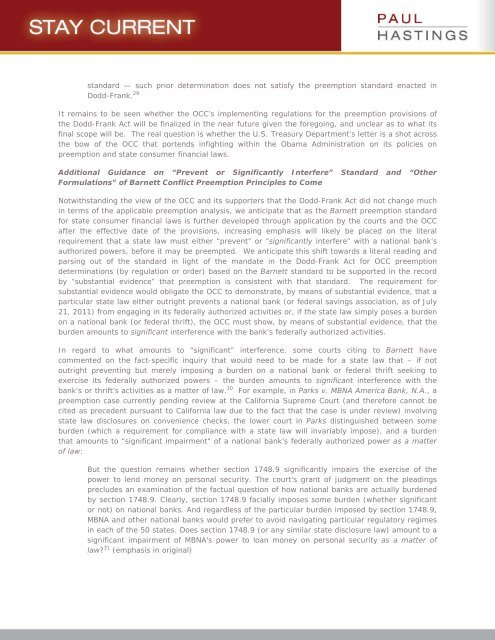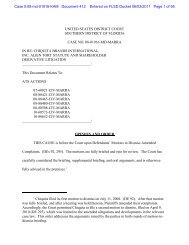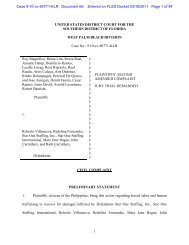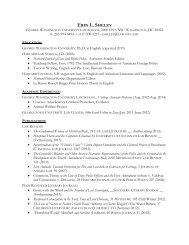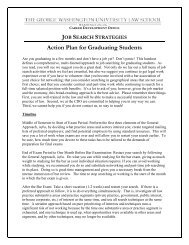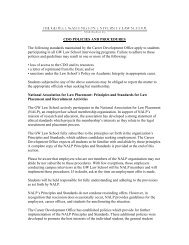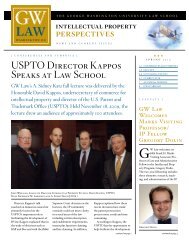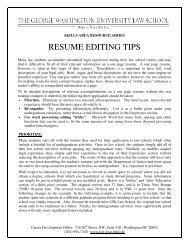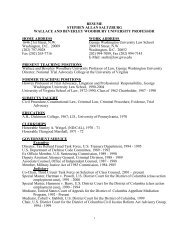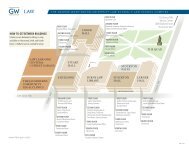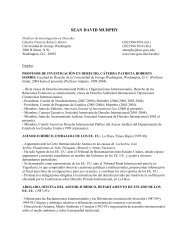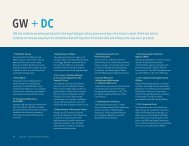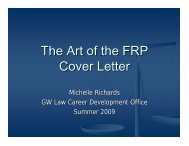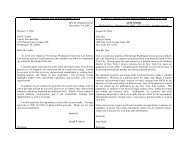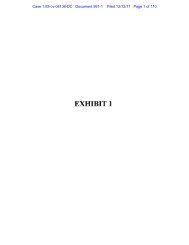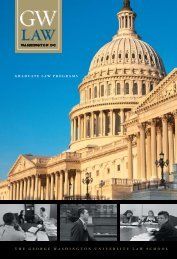CLE Materials for Panel #1 - George Washington University Law ...
CLE Materials for Panel #1 - George Washington University Law ...
CLE Materials for Panel #1 - George Washington University Law ...
Create successful ePaper yourself
Turn your PDF publications into a flip-book with our unique Google optimized e-Paper software.
standard — such prior determination does not satisfy the preemption standard enacted in<br />
Dodd-Frank. 29<br />
It remains to be seen whether the OCC’s implementing regulations <strong>for</strong> the preemption provisions of<br />
the Dodd-Frank Act will be finalized in the near future given the <strong>for</strong>egoing, and unclear as to what its<br />
final scope will be. The real question is whether the U.S. Treasury Department’s letter is a shot across<br />
the bow of the OCC that portends infighting within the Obama Administration on its policies on<br />
preemption and state consumer financial laws.<br />
Additional Guidance on “Prevent or Significantly Interfere” Standard and “Other<br />
Formulations” of Barnett Conflict Preemption Principles to Come<br />
Notwithstanding the view of the OCC and its supporters that the Dodd-Frank Act did not change much<br />
in terms of the applicable preemption analysis, we anticipate that as the Barnett preemption standard<br />
<strong>for</strong> state consumer financial laws is further developed through application by the courts and the OCC<br />
after the effective date of the provisions, increasing emphasis will likely be placed on the literal<br />
requirement that a state law must either “prevent” or “significantly interfere” with a national bank’s<br />
authorized powers, be<strong>for</strong>e it may be preempted. We anticipate this shift towards a literal reading and<br />
parsing out of the standard in light of the mandate in the Dodd-Frank Act <strong>for</strong> OCC preemption<br />
determinations (by regulation or order) based on the Barnett standard to be supported in the record<br />
by “substantial evidence” that preemption is consistent with that standard. The requirement <strong>for</strong><br />
substantial evidence would obligate the OCC to demonstrate, by means of substantial evidence, that a<br />
particular state law either outright prevents a national bank (or federal savings association, as of July<br />
21, 2011) from engaging in its federally authorized activities or, if the state law simply poses a burden<br />
on a national bank (or federal thrift), the OCC must show, by means of substantial evidence, that the<br />
burden amounts to significant interference with the bank’s federally authorized activities.<br />
In regard to what amounts to “significant” interference, some courts citing to Barnett have<br />
commented on the fact-specific inquiry that would need to be made <strong>for</strong> a state law that – if not<br />
outright preventing but merely imposing a burden on a national bank or federal thrift seeking to<br />
exercise its federally authorized powers – the burden amounts to significant interference with the<br />
bank’s or thrift’s activities as a matter of law. 30 For example, in Parks v. MBNA America Bank, N.A., a<br />
preemption case currently pending review at the Cali<strong>for</strong>nia Supreme Court (and there<strong>for</strong>e cannot be<br />
cited as precedent pursuant to Cali<strong>for</strong>nia law due to the fact that the case is under review) involving<br />
state law disclosures on convenience checks, the lower court in Parks distinguished between some<br />
burden (which a requirement <strong>for</strong> compliance with a state law will invariably impose), and a burden<br />
that amounts to “significant impairment” of a national bank’s federally authorized power as a matter<br />
of law:<br />
But the question remains whether section 1748.9 significantly impairs the exercise of the<br />
power to lend money on personal security. The court's grant of judgment on the pleadings<br />
precludes an examination of the factual question of how national banks are actually burdened<br />
by section 1748.9. Clearly, section 1748.9 facially imposes some burden (whether significant<br />
or not) on national banks. And regardless of the particular burden imposed by section 1748.9,<br />
MBNA and other national banks would prefer to avoid navigating particular regulatory regimes<br />
in each of the 50 states. Does section 1748.9 (or any similar state disclosure law) amount to a<br />
significant impairment of MBNA's power to loan money on personal security as a matter of<br />
law? 31 (emphasis in original)<br />
5<br />
5


